The first and only Vice-Presidential Debate
The first and only debate between vice-presidential candidates Senator Kalama Harris (D-Cal.) and current Republican vice-president Mike Pence, took place on Wednesday, 5th October 2020, in Salt Lake City 1. The debate was moderated by Susan Page of USA Today.
The discussion was somewhat more civilized and orderly than the one held by presidential candidates Joe Biden and Donald Trump on 29th September 2020. Yet, there was some exchange of blows and crosstalk. This analysis will take a deeper look at the discussion, in order to provide an overview and an analysis of the most important topics covered and arguments made during the debate.
In the beginning, Susan page set out the rules of the debate: The debate would be divided into nine segments, of about ten minutes each. In the beginning of a segment, the moderator, Susan Page, would pose a question to each candidate. Sometimes they would be asked the same question, sometimes, they would be asked different questions on the same topic. Each candidate would have about two minutes to answer a question. Then, they would take approximately six minutes to jointly discuss the issue, before moving on to the next topic.
I. The COVID-19 pandemic
The topic of the first segment was, no surprise, the COVID-19 pandemic, that cost above 210.000 lives in America.
Susan Page mentioned the immense obstacles and choices that the future administration would face due to the consequences of the pandemic. She then asked Senator Harris, what she and the Biden administration would do, once in office, that a Trump administration would not do. Harris started her answer by claiming that the American people have witnessed what is the “greatest failure” of any administration in the history of the US. She further accused the Trump administration of covering up and minimizing the risks of the COVID-19. Further, she argued that the current administration still does not have a plan, but Biden does – mainly contact tracing, testing, the development of vaccines and making sure that a vaccine would be free for all. She also argued that, based on the administration’s mismanagement of the COVID-19 pandemic, it has forfeited its right to reelection.
Page then turns to Vice-President Pence, who heads the administration’s Coronavirus task force, and asked him why the death toll of COVID-19 in America is so much higher in comparison with other wealthy nations. Pence argued that President Trump has, “from the very first day”, “put the health of the American people first”. He also argued that Trump was the first President ever to suspend all travel from China, the second-largest economy. Pence also argued that this act potentially saved hundreds of thousands of lives and gave them time to step up national mobilization, reinvent testing and acquire medical supplies.
In general, Pence did not answer the question – rather, he praised the administration’s handling of the crisis – despite the fact that over 210.000 Americans lost their life due to this virus, in total over 7 million American’s were infected with the virus, and millions lost their jobs.
Then, there was a round of back-and-forth between Harris and Pence, where Harris argued that the administration greatly failed in informing the American people. Pence essentially continued to praise the administration and provided questionable justifications for its handling of the situation.
Regarding the super spreader event in the Rose Garden, where Trump contracted the virus, Pence was asked how he expects the American people to follow the administration’s guidelines, if not even the administration is doing so. The vice-president gave an incoherent answer, that had little do with what was actually asked and was barely informative. Then they moved to the next topic of discussion.
II. The role of the vice president
Page asked the vice-presidential candidates whether they had talked with the presidential candidates about safeguards or procedures when it comes to the issue of presidential disability. Some voters raised concerns about the age of both presidential candidates, therefore, Page asked whether they had a conversation or reached an agreement in the case of presidential disability. Both candidates, more or less, dodged the question and did not go further into the state of health of the presidential candidates. Regarding Trump’s recent hospitalization and the fact that his doctors gave misleading answers or refused to answer basic questions, Pence argued that the doctors practised outright transparency. Harris, being asked whether she thinks voters deserve the right to know more about the health status of the president, similarly argued that Biden has been very transparent. Then she quickly jumped to the issue of taxes, stating that Biden has also always been transparent when it comes to taxes, in comparison to Trump. Pence, then evaded the discussion of Trump’s taxes, and praised the president as businessmen who created jobs and allegedly paid millions of US-Dollars in taxes.
III. Economy
Page then changed to the topic of economy, addressing the issue of the recent rise in unemployment due to the COVID-19 crisis, and mentioned that especially Latinos, Blacks and women have been hit the hardest.
She first turned to Senator Harris to talk about the Biden campaign, which presented plans to boost the economy and would raise four trillion US-Dollars in taxes from wealthy individuals in corporations. Page mentioned that economist argued that this move would curb entrepreneurial ventures, which was needed to fuel growth and create workplaces. She therefore asked if raising taxes would put the economy at risk.
In her response, Harris referred to the tax bill that Trump introduced, which only benefitted the richest one per cent and costs the American people two trillion US-Dollar. She promised that Biden will get rid of this bill on his first day in office. She further explained that the Biden administration would then invest the money, that they will recover from abolishing this tax bill, in infrastructure, such as renewing roads and bridges but also investing in clean energy. Biden will also invest it into innovation, research and science.
Turning to Pence, Page asked if Americans should be prepared for an economic recovery that is not going to take months, as initially promised, but a year or even more, as suggested by the latest economic reports.
As answer, Pence gave some statistics about jobs created by the Trump administrations and argued that Biden and Harris would raise taxes – which is misleading, since Biden said he would not raise them for people with an income of less than 400.000 US-Dollar per year. Pence also claimed that Biden would ban fracking, which would cost thousands of jobs, and repeal tariffs. Harris denied Pence’s claims and assured the American people that Biden will not ban fracking.
IV. Climate Change
Another substantial part of the debate was spent to discuss the green new deal and climate change. Page asked vice-president Pence whether he believed in the conclusions of the scientific community on man-made climate change.
Pence claimed that “President Trump has made a commitment to conservation and to the environment”, and further argued that the Biden-Harris administration would re-enter the Paris Climate agreement and impose a Green New Deal that would crush American jobs and increase the energy costs for American households. Pence also made the argument that Trump and he both believe that the progress they made in a cleaner environment has been happening because the US has a strong free-market economy. Apparently, the US reduced its CO2 emissions compared to those countries that are still in the Paris Agreement, and it achieved this through innovation as well as through fracking and natural gas. Harris countered that this is not true.
Page then asked Harris, what the Biden-Harris Administrations stance on the Green New Deal, which she co-sponsored, would be, since Biden in the last debate argued that he would not support the deal, even though the deal is mentioned on the campaign’s website.
Harris assured that Biden will not ban fracking. He will also ensure that more jobs are being created, and that part of these jobs will be about clean and renewable energy. She then blamed the Trump administration for not believing in science, which she called a pattern within this administration. Harris also referred to climate change as an existential threat.
When Page asked Pence whether he agrees that climate change is an existential threat, he did not provide a clear answer. Instead, he stated that the climate is changing and that the Trump administration will follow the science, before he went on to accuse Biden of planning to repeal the Trump tax cuts which allegedly benefitted American family households (while Kamala Harris said that these tax cuts only benefitted the superrich), and that Biden will ban fracking.
V. US relationship with China
As the fifth topic of the debate, they discussed the US relationship with China. Susan Page explained that the US has probably no more complicated or consequential foreign relations than the one with China. It is a huge market for US agriculture products and a substantial partner for the US in dealing with climate change and North Korea.
Page then asked Vice-President Pence how he would describe the relationship with China, to which he responded that they want to improve the relationship but they will level the playing field with China. He also argued that China is to blame for the Coronavirus and that they will hold China accountable “for what they did to America” with this virus – without going into detail how they will do that.
Harris, being asked the same question, answers that the Trump administration’s approach to China has resulted in the loss of American lives and jobs as well as America’s standing. She called on the failure of leadership by this administration, which resulted in diminishing respect from leaders around the world vis-à-vis the American president. The debate then shifted to the sixth topic of discussion, American leadership in 2020.
VI. The role of American leadership in 2020
Regarding changes in the global leadership, Susan Page asked Senator Harris what her definition of the role of American leadership is in 2020. Harris explained that foreign policy are simply relationships, and we need to be loyal to our friends and keep our adversaries in check. According to her, Trump has betrayed the United States’ friends and embraced Dictators, such as Putin in Russia. Trump also walked away from agreements, such as the Nuclear Deal in which the US was with friends and allies. And Trump, by neglecting these agreements, his unilateral approach and his isolationism, made America less safe.
Pence, on the other hand, argued that Trump kept his promises, as for example to move the US embassy to Jerusalem. Somehting, which the Obama administration, according to Pence, only promised, but never delivered 2. Trump allegedly also took down the ISIS caliphate and the leader Al-Baghdadi. Under Trump, likewise Qasim Soleimani was killed, which made the US safer, Pence argued. One may argue whether that actually made the US any safer.
Harris countered that Trump has no respect for the US military and the sacrifices they make – an argument which resulted in a long back and forth between Kamala Harris and Mike Pence, before the Moderator could move to the next topic, the Supreme Court.
VII. Supreme Court
Page introduced the topic of the most recent Supreme Court nomination of Amy Coney Barett, after the death of Justice Ruth Bade Ginsburg. The nomination would cement the Courts conservative majority and, as a consequence, this may lead to more abortion restrictions, and even overturning the landmark ruling on Wade vs Roe – meaning that access to abortion would then be up to the states.
She therefore asked both candidates whether they would like to see their home state to do with regard to abortion.
Pence announced that he hopes that Coney Barett gets a fair hearing and will not be attacked for her Christian faith. He also wishes that she will be respected, voted and confirmed in the Supreme Court. He did not provide an answer as to what he would like his home state to do regarding abortion rights, but made clear that he is pro-life.
Harris stated that she would hope to first fill the seat in the White House before filling the Seat in the Supreme Court. She then continued that she will always fight for a woman’s right to make a decision about her own body – it should be her decision only and not the decision of Trump or Pence or anybody else. But she also mentioned that other things are before the court, such as the Affordable Care Act, which President Trump is currently trying to get rid of, and which means that there would be no protections for people with pre-existing conditions.
Pence dodged the question of how the Trump administration will protect people with pre-existing conditions and give access to affordable healthcare. Instead, he then wrongly argued that Harris and Biden would support taxpayer-funded late-term abortion. He also directly addressed Harris, asking whether she and Biden plan to add seats and pack the Court, once elected, in case Coney Barett is confirmed.
Harris dodged the question, and reiterated that first, the president should be elected, and then a decision should be made on who will serve for a lifetime on the Supreme Court. She referred to a similar situation during the Administration of Abraham Lincoln, when a seat in the Court needed to be filled shortly before elections, and President Lincoln argued that the seat should be filled only after the elections, by the newly elected president.
VIII. Racial Justice
Susan Pence then moved to the next topic, where they talked about the issue of racial justice. Page referred to the unjust killing of Brianna Taylor by police officers.
Page then addressed Harris, asking her whether she thinks justice for Brianna was served. Harris argued that justice was not served. Her life was taken violently and unjustifiably. She then also referred to the killing of George Floyd. Harris also stated that police reform is needed as well as a criminal justice reform.
Pence received the same question, of whether justice was served for Brianna Taylor. He said that the family of Brianna Taylor has his sympathy, but he trusts the justice system. He also said there is no excuse for what happened with Floyd and that justice will be served. But there is similarly no excuse for the rioting and looting that followed these deaths.
Harris further criticized Trump’s response when asked to condemn White Supremacy. Pence countered that Trump arguably has condemned White Supremacists and argued that the president himself has Jewish grandchildren – suggesting that this automatically means he could not be racist and supporting White Supremacy.
They then moved to the ninth and last topic of discussion – the upcoming election itself.
IX. The Election itself
Page turned to the issue of the election itself and stated that Trump himself has refused to commit to a peaceful transition of power several times. She then asked Harris what steps they would take, in case she and Biden win and Trump refuses to accept the result.
Harris mentioned that she and Biden have a broad support base, and that she believes in the democracy. She further called on the people to vote.
Page then addressed Pence, asking what would be his role as vice president, if Biden wins the election and Trump refuses a peaceful transition to power.
Pence argued that he has confidence that Trump will win the elections. Regarding the outcome of the elections, he blamed the Democrats for trying to overturn the outcome of the 2016 election in the past four years. He did not go into detail about what he will do, in case Trump does not win the elections and refuses to accept the result.
Conclusion
All in all, one can say that Pence mostly beat about the bush when asked a question, outright evaded questions, failed to give comprehensive answers and left the public with more questions than answers.
Senator Harris also dodges some questions, but in general, gave clearer and more comprehensible answers than Pence. It partly seemed as if Pence tried to play the blame game – whenever asked a difficult question, he would rather point to the Democrats talk about something they plan to do, such as ban fracking, or did in the past. Generally, some of his accusations were simply unfounded and untrue.
In conclusion, one may say that Senator Harris proved to be competent, well-informed and powerful – reminding Pence that it was her turn to speak, whenever he interrupted her, and spoke about facts.
Pence, on the contrary, often deflected from the original topic and gave vague or even confusing responses most of the time – likely, the fly that landed on his head during the debate and stayed there for four minutes got more attention than he himself and the things he actually talked about.
Sources
New York Times (2020): Fact-Checking the Vice-Presidential Debate, https://www.nytimes.com/live/2020/10/07/us/fact-check-harris-pence-debate?action=click&module=Spotlight&pgtype=Homepage, accessed 08.10.2020

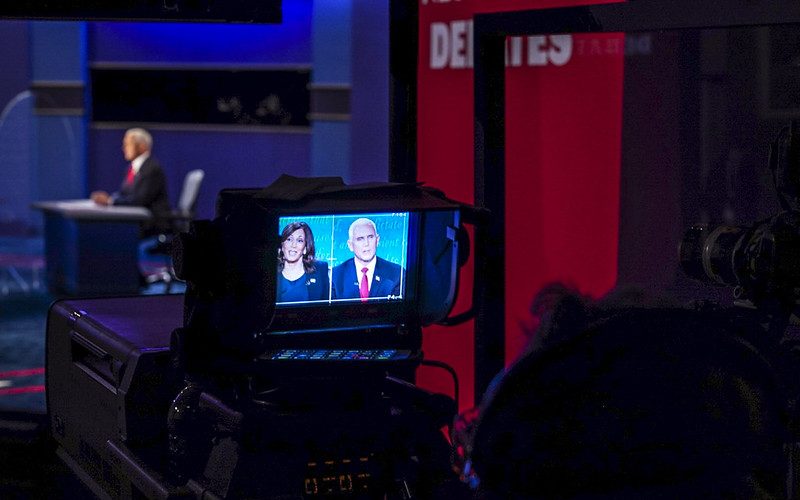
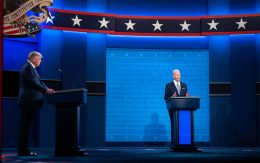
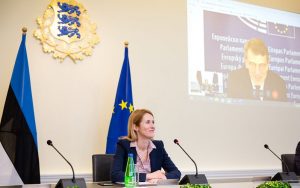
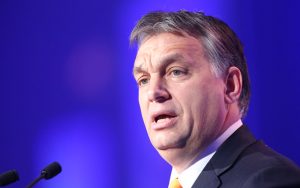
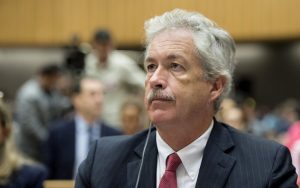
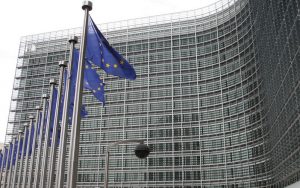

Be First to Comment